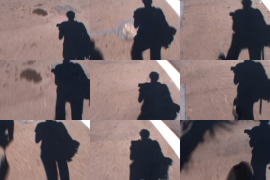
POWER, SPECTACLE, AND REVOLUTIONARY MOVEMENTS
Retort: Opening Salvo
Retort's installation at the Seville Biennial (about which more in a later posting) had its origins in a broadsheet, Neither Their War Nor Their Peace, that we produced for the manifestations of Spring 2003 on the eve of the invasion of Iraq. We well recall how many felt our prologue to be hyperbolic, even hysterical: "We have no words for the horrors to come, for the screams and carnage of the first days of battle, the fear and brutality of the long night of occupation that will follow, the truck bombs and slit throats and unstoppable cycle of revenge, the puppets in the palaces chattering about 'democracy', the exultation of the anti-Crusaders, Baghdad descending into the shambles of a new, more dreadful Beirut, and the inevitable retreat (thousands of bodybags later) from the failed McJerusalem." Who would now call this hyperbole?
We produced the broadsheet because we were unwilling to go into the streets under either of the banners we knew would dominate the marches - "Peace" and "No Blood for Oil". To the opponents of the war, we wished to say that a deeply militarized US state, and indeed the reality of permanent war, rendered inadequate the notion of "peace" as a rallying cry and a strategy. We had in mind the indelible line of Tacitus, "They make a desert and call it peace", which speaks to us across the centuries. These were words he put in the mouth of a Gaelic chieftain on the eve of battle against a Roman legion in the Scottish highlands, at the far north-western edge of the empire. Tacitus reminds us what kind of peace is delivered by the masters of war – it is the peace of the "peace process" , the peace of cemeteries. The anti-war movement, if it was not to evaporate again, had to recognize the full dynamics of US militarism – to understand that peace, under current arrangements, is war by other means. read more
We produced the broadsheet because we were unwilling to go into the streets under either of the banners we knew would dominate the marches - "Peace" and "No Blood for Oil". To the opponents of the war, we wished to say that a deeply militarized US state, and indeed the reality of permanent war, rendered inadequate the notion of "peace" as a rallying cry and a strategy. We had in mind the indelible line of Tacitus, "They make a desert and call it peace", which speaks to us across the centuries. These were words he put in the mouth of a Gaelic chieftain on the eve of battle against a Roman legion in the Scottish highlands, at the far north-western edge of the empire. Tacitus reminds us what kind of peace is delivered by the masters of war – it is the peace of the "peace process" , the peace of cemeteries. The anti-war movement, if it was not to evaporate again, had to recognize the full dynamics of US militarism – to understand that peace, under current arrangements, is war by other means. read more

